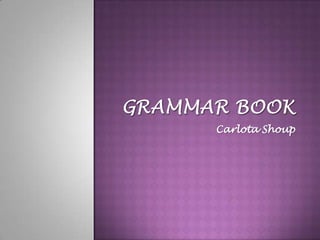
Grammar book
- 2. Qué vs. Cuál Ser Estar Transitions Imperfect Triggers Acabar de + Infinitive Hacer + Time + Qué + Present Tense Verbs Like Gustar Reflexives Tu Commands -Affirmatives -Negatives -Irregulars DOP Placement Preterite
- 3. Dates (¿Que dia es hoy?; Descriptions ¿Cuál es la fecha?) Events (¿Cuándo/dónde es?) D Origin E O Ser: *Is/are P C Possession *Permanent (¿De quién es?) *Nationality Characteristics *Times & Dates *Doctor PED R T O Relationships Time v (¿Quién es?) (¿Qué hora es?) Occupation (¿Qué hace?)
- 4. ¿Cómo estás? Bien, mal, ¿Cómo estás? regular, Enojado, triste, cansado, enfermo, etc. alegre, contento, emocianado, nervioso, tranquilo, ocupado, etc. Health Emotions ¿Dónde estás? EN: La casa, la escuela, el Location supermercado, el banco, el EN gimnasio, el café, el aeropuerto, el museo, la biblioteca, etc. ESTAR Present Condition ¿Cómo está? Abierto, cerrado, verde, maduro, limpio, sucio, roto, frio, caliente, lluvioso , soleado, nublado, etc. I ¿Qué estás haciendo? Jugando, estudianto, contando, leyendo, escribiendo, hablando, G N mirando la tele, paseando, caminado, carriendo, haciendo ejercicio, etc. Ar- Ando Er/Ir- Endo -Yendo
- 5. Tambien Ahora Primero Despues Ni-ni Por-eso Asi-que Pero Entonces Y
- 6. Time/date/age/feelings/descriptions Past tense No definite beginning or end Interrupted activity (Cuándo) Ongoing action (Was/were) Repeated (Used to)
- 7. Todos los días A muendo A veces Siempre Cada día Los lunes Generalmente Mientras De vez en cuando Muchas veces Frecuentemente
- 8. Used to explain something that was just done Example: Acabo de leer el libro.
- 9. HACER Usedto talk about how much time you have been doing something Example: Hace treinta y Time cinca minutos que Paula espera el autobús QUÉ v Present Tense
- 10. Used to express the liking/disliking of an object(s). I like-me gusta(n) You like-te gusta(n) He/she/formal you-le gusta(n) We like-nos gusta(n) Os gusta(n) They like-les gusta(n) No before me no me gusta
- 11. *RULES: 1. Pick pronoun 2. Conjugate verb 3. Put pronoun in front Used in “yo” Me form. Reflexive Te Used in “tu” Pronouns form. Se Used in “el, ella, ellos, ellas, ustedes” form. Os Nos Used in *The person/thing “nosotros” form. doing=The Used in person/thing “vosotros” form. receiving
- 12. Affirmative Irregular Simply drop the “S” Di- decir Negative Haz- hacer Di- no digas Ve- ir Pon- poner Haz- no hagas Sal- saler Ve- no vayas Se- ser Pon- no pongas Ten - tener Sal- no salgas Ven- vener Se- no seas Ten- no tengas Ven- no vengas
- 13. Can attach to an affirmative command
- 14. e i aste iste o io amos imos aron ieron